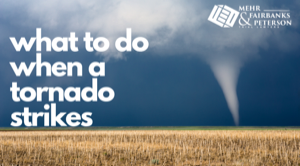
As spring approaches, it is important that homeowners know their options should a catastrophic storm damage their home and property. We are only roughly three months into the year, and tornadoes have already caused significant damage nearby. Nashville, Tennessee was just struck by an EF3 strength tornado outbreak between March 2 and March 3. During these tornadoes, parts of Kentucky were affected as well.
When you think of a major storm, a tornado may not be the first type of damage that comes to mind. After all, hurricanes and earthquakes typically have much longer lasting effects, but tornadoes cause just as many problems as any other type of storm. Tornadoes typically accompany strong winds, flooding and lightning—all of which bring their own type of damage along as well.
Tornadoes are measured using the Fujita scale with F5 being the most intense level of damage with winds ranging from high 200s to 300s, F4 with wind speeds of low to mid 200s, F3 with wind speeds ranging from mid 100s to low 200s, F2 tornadoes have strong wind speeds of low to mid 100s, F1 tornadoes have moderate wind speeds of 70s to low 100s and F0 tornadoes are usually below 75 miles per hour. No matter the level of intensity of tornadoes, all of them impact their victims significantly. Even an F0 tornado can cause significant damage to your home.
High wind speeds can cause downed power lines, damage to your roofing, siding and other parts of your home, and can even cause damage to your home’s foundation. As mentioned previously, tornadoes are multi-force storms, so along with high wind speeds, tornadoes can accompany flooding. Floods cause significant damage to your house as well. Flooding can lead to mold in your home and harm your floors and dry wall. Lightning is usually a major component during tornadoes too. Lightning damage can cause significant damage to electrical items in your home, leaving you with no option but to replace the televisions, cable and internet routers, phones, tablets and other electronics in your home, which ends up being a costly, unexpected expense.
While the damage tornadoes leave behind can be detrimental, there are steps homeowners can take to prepare for the worst.
- Before a storm, be sure to contact your insurance company to make sure you know what is covered under your homeowner’s insurance policy. Confirm that you have coverage in the event of a tornado. Most basic homeowners’ policies cover tornado damage, but it’s still best to check beforehand.
- Check to see if the contents of your home are covered as a result of a tornado.
- Secure all of your belongings the best that you can. Unplug all electronics from outlets before a storm starts, and if you are living in an area prone to flooding, try to move any furniture in the basement or lower levels of your home to a higher location.
After a tornado, it is important to evaluate the damage to your home. Some damage may not seem as severe as it is upon initial inspection, so it is important to thoroughly access the damage.
- If you notice any damage to your home or contents, immediately file a claim with your homeowner’s insurance company.
- Take photos of the damages to your home or belongings.
After the claims process begins, it is important to you know your rights. Although most policies cover damage caused from tornadoes and other major storms, some claims still may be wrongfully denied. Insurance companies can use terminology to make your claim denial seem justified, but that doesn’t mean you are not entitled to compensation for the damages you suffered. You have the right to hire an experienced insurance attorney to assist you with appealing the denial of your claim to get you the money you deserve to repair or replace your home. If your tornado insurance claim has been denied by your insurance company and you have questions about the denial of your claim, click here.
For a free evaluation of your case, contact an experienced insurance claims attorney at Mehr Fairbanks Trial Lawyers by calling 800-249-3731, chatting with an intake manager, or completing our contact form by clicking here.
 Kentucky ERISA Disability & Life Insurance Claim Lawyers
Kentucky ERISA Disability & Life Insurance Claim Lawyers

